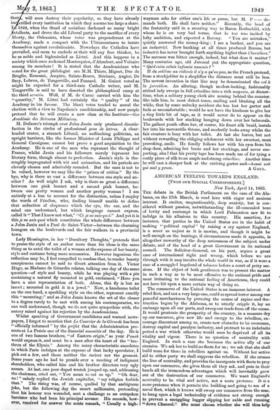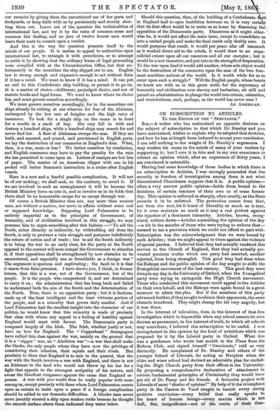AMERICAN FEELING TOWARDS ENGLAND. [Fnolt OUR SPECIAL CORRESPONDENT.]
New York, April 14, 1863.
THE debate in the British Parliament on the case of the Ala- bama, on the 27th March, is read here with eager and anxious interest. It excites, unquestionably, deep anxiety, but is con- sidered without passion, notwithstanding the ill-concealed tone of levity and contempt in which Lord Palmerston saw fit to indulge in his allusions to this country. His assertion, for instance, that parties in the United States are in the habit of making " political capital " by raising a cry against England, is a sneer as unjust as it is unwise, and though it might be well enough on the hustings, if circumstances made it apposite, is altogether unworthy of the deep seriousness of the subject under debate, and of the head of a great Government in its national council. The Solicitor-General, on his part, argues a great case of international right and wrong, which before we are through with it may involve the whole world in war, as if it were a case of a smuggled hogshead of tobacco before a court of petty ses- sions. If the object of both gentlemen was to present the matter in such a way as to be most offensive to the national pride and most irritating to the national feeling of Americans, they could not have hit upon a more certain way of doing so.
The commerce of the United States is an immense interest. A
rebel fleet, and not a very large one, could so spread terror among our peaceful merchantmen by pursuing the course of rapine and des- truction begun by the Alabama, as to utterly cripple it, lay an embargo upon all our ports, and sweep our trade from off the ocean. It would prostrate the prosperity of the country, in a measure dry up our resources, give new life and energy to the rebellion, en- courage discontent among us, create new obstacles to be overcome, destroy capital and paralyze industry, and protract to an indefinite period a war which otherwise would soon be deprived of all its vitality and vigour. There is no question of neutrality with England. In such a case she becomes the active ally of our enemies. We ask her to build no fleets for us ; we ask that she shall build none for those in rebellion against us. Without her active aid to either party we shall suppress the rebellion. If she crosses the line of neutrality, and provides the insurgents with fleets to prey upon our commerce, she gives them all they ask, and puts in their hands all the tremendous advantages which will inevitably grow out of the destruction of our commerce. We want England's neutrality to be vital and active, not a mere pretence. It is a mere pretence when it permits the buy ding and going to sea of a naval fleet, which it knows will sweep our commerce from the seas, to bang upon a legal technicality of evidence not strong enough to prevent a smuggling lugger slipping her cable and running "down Channel." She must choose whether she will thus help
our enemies by giving them the unrestricted use of her ports and dockyards, or keep faith with us by persistently and sternly shut- ting them out. Leave out of the question the technicalities of international law, and try it by the rules of common sense and common fair dealing, and no jury of twelve honest men would leave their seats to consult upon a verdict.
And this is the way the question presents itself to the minds of our people. It is useless to appeal to authorities upon international law, to entangle it with precedents, or to attempt to settle it by showing that the ordinary forms of legal proceeding were complied with at the Circumlocution Office, but that un- fortunately in the meantime the ship slipped out to sea. English law is strong enough and expansive enough to act without form if it has a mind. We want to know if it has a mind. It can put an end to this Confederate ship building, or permit it to go on. It is a matter of choice--deliberate, prejudged choice, and not of statute-books and legal forms. We want to know where its choice lies, and must govern ourselves accordingly.
We must govern ourselves accordingly, for in the meantime our ships already lie rotting at our wharves for fear of the Alabama, embargoed by the low rate of freights and the high rates of insurance. To look for a single ship on the ocean is to hunt for a needle in a stack of hay. She may fall in with and destroy a hundred ships, while a hundred ships may search for and never find her. A fleet of Alabamas sweeps the seas. If they are built, and manned, and armed, and provisioned in English ports, we lay the destruction of our commerce at England's door. What, then, is a war, more or less ? We better ourselves by retaliation, and English commerce may have to pay the penalty for the ruin she has permitted to come upon us. Letters of marque are but bits of paper. The master of an American clipper with one in his pocket will better Semmes's instruction in a cruise after English vessels.
Here is a new and a fearful possible complication. It will not be of our seeking ; we shall seek, on the contrary, to avoid it. If we are involved in such an entanglement it will be because the British Ministry force us into it, and so involve us in its folds that there shall be no honourable escape for us except through war.
Of course a British Minister does not, any more than meaner men, act without a motive, nor move in affairs without some real or supposed knowledge. Supposing Lord Palmerston to be entirely impartial as to the principles of Government, of humanity, and of civilization involved in this struggle, we may presume him to argue something after this fashion :—" To aid the North, either directly or indirectly, by withholding aid from the South, is only to protract a vain struggle and postpone indefinitely the return of cotton and of trade ; but to aid the South indirectly is to bring the war to an early close, for the party at the North opposed to the contest will soon compel the Government to abandon it, if their opposition shall be strengthened by new obstacles to be encountered, and especially one so formidable as a foreign war." The argument is specious and captivating ; the fault in it is that it starts from false premises. I have shown you, I think, in former letters, that this is a war, not of the Government, but of the people. It is the people who comprehend it, and are determined to carry it on ; the administration that has hung back and failed to understand both the aim of the South and the determination of the North. True, there is an opposition party ; but it is factious, made up of the least intelligent and the least virtuous portion of the people, and is a minority that grows daily smaller. And if Lord Palmerston had the smallest insight into the character of our politics, he would know that this minority is made of precisely that class with whom any appeal to a feeling of hostility against England would meet with favour. The Democratic party is composed largely of the Irish. The Irish, whether justly or not, have no love for England. The " Copperhead " demagogues have rallied this class against the war, mainly on the ground that it is a " nigger " war, an " Abolition war "—a war that shall make the blacks, the only people whom they have now the privilege of considering their inferiors, their equals and their rivals. But proclaim to them that England is to mix in the quarrel, that the war with the South involves a war with England, and there is not an Irishman in the land who would not throw up his hat for a fight that appeals to the strongest antipathy of his nature, and swear the bloodiest vengeance against the cause that England es- pouses. A war with you would thus be really popular with none among us, except precisely with those whom Lord Palmerston counts upon as certain to insist upon a peace if a foreign complication should be added to our domestic difficulties. A blinder man never more jauntily steered a ship upon sunken rocks because he thought the smooth surface above them indicated deep water below.
Should this question, then, of the building of a Confederate in England lead to open hostilities between us, it is very cer that its first effect would be to unite us at home by disarming the opposition of the Democratic party. Disastrous as it might other- wise
be, it would not affect the main issue, except to consolidate us into a united people and make the final result only doubly sure. It would postpone that result, it would put peace afar off insomuch as it worked direct aid to the rebels, it would draw to an unpa- ralleled extent upon all our resources and all our energies ; but it would be a new incentive, and put into us the strength of desperation. To the war upon land it would add another, whose sole object would be the destruction of the commerce upon the seas of the two fore- most maritime nations of the world. Is it worth while for us to enter upon such a struggle ? Will the English people, whose hearts we know are with us in this great strife for the supremacy of humanity and civilization over slavery and barbarism, sit still and permit an administration to plunge the world into crimes, calamities, and wretchedness, such, perhaps, as the world has never seen ?
AN AMERICAN.































 Previous page
Previous page